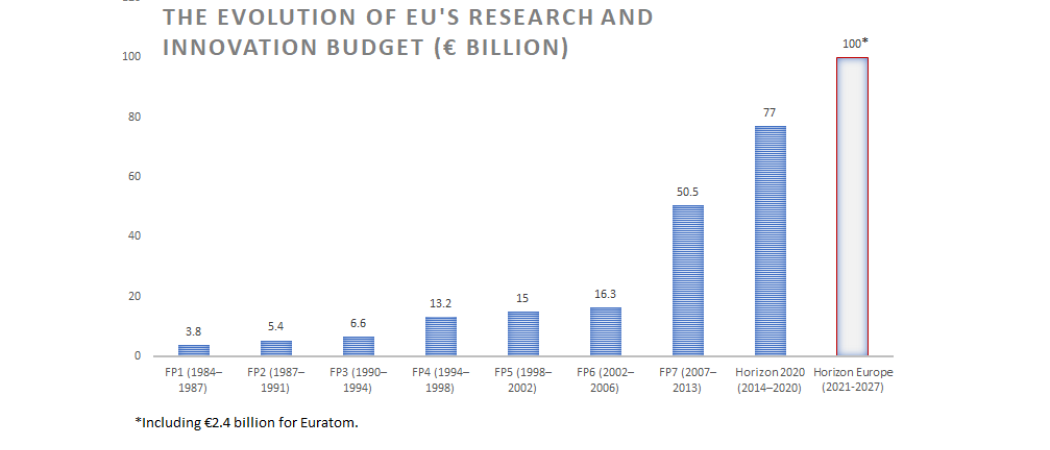MEPs and research lobby groups say €100 billion is good but not enough. Parliament ‘will fight’ for €120 billion.

“Could do better.” That’s the first reaction from the ever-fractious European research community, as it absorbed the European Commission’s proposal Wednesday to boost its research and innovation budget to €100 billion. Many vowed to push for more in the months of negotiations to come.
The figure announced by the Commission includes €97.6 billion for Horizon Europe, the EU’s flagship research programme, and €2.4 billion for the Euratom nuclear research programme. For Horizon Europe, that’s an increase of almost 30 per cent – when adjusted for inflation – on the EU’s existing programme of €77 billion. But it falls short of the €120 billion to €160 billion research lobbyists have been praying for.
The part good, part bad reaction was typified by Christian Ehler, a German member of the European Parliament. “Today’s €100 billion proposal to the research and innovation sends the right signal to the research community and to member states on the importance of this sector to Europe’s economy.”
Still, Ehler added, it’s not enough. “The European Parliament will fight for increasing this figure to €120 billion,” he said.
Others also vowed to battle on, through the two-plus years of negotiations with Parliament and Council. “The direction is right, but we would have hoped to match the ambitions in terms of having a higher amount there,” said Thomas Estermann, director of governance, funding and public policy at the European University Association (EUA).
The Commission has taken a step in the right direction by doubling investment in its education programme Erasmus +. However, universities “cautiously welcome” the increased spending on research and innovation, which “fall short of expectations,” said Jan Palmowski, Secretary-General of the Guild of European Research-Intensive Universities.
European universities argue that the increase is not ambitious enough to improve the average success rate, currently around 12 per cent. It also does not provide enough funding to get large-scale research “missions” off the ground. “This would require a full scale doubling of the budget allocated to Horizon 2020,” the EUA said in a statement.
The League of European Research Universities (LERU) is urging the European Parliament and member states to agree on a further increase of the research and innovation budget. “To be clear, €100 billion is a bare minimum for an ambitious, well-functioning and impactful FP9 that will need to meet many challenges,” said Kurt Deketelaere, Secretary-General of LERU.
The increase is “mild”, said Science Europe. “We are concerned that the current proposal will fail to live up to the ambitions of Horizon Europe,” Stephan Kuster, secretary general of the Brussels-based advocacy group for research funders and organisations, said in a statement. Europe does not lack excellence or potential for innovation, it lacks funding: three-quarters of all scientifically excellent proposals to Horizon 2020 went unfunded, the statement added.
Representatives of European research infrastructures say the proposed budget matches their expectations. But, they also expect that more resources will be allocated for research from other programmes. “I expect that in the next [EU budget], significant resources in support of research and innovation, such as infrastructure investments and deployment, will be funded from other programmes,” said Jana Kolar, CEO of Central European Research Infrastructure Consortium (CERIC-ERIC).
BusinessEurope is also calling on decision makers in Brussels and in the member states to prioritise research and innovation in upcoming negotiations. “We acknowledge the Commission’s efforts to increase spending on research and innovation activities but would have liked to see even more ambition,” said Director General Markus J. Beyrer.
On the other hand, European Biopharmaceutical Enterprises, an industry association, was impressed, calling the research increase “great news” on its Twitter page. Also, the European Technology Platform for Sustainable Chemistry (SusChem) “welcomes” the budget increase.
However, the haggling in the Parliament will be lengthy and challenging, as many MEPs will also argue for reversing cuts proposed to cohesion and agriculture funds.
More reactions from the Parliament
“We welcome the Commission’s proposal of doubling the funds of the Erasmus+ programme and the significant increases for the research programmes, climate action or the new investment in security and defence,” said José Manuel Fernandes MEP, the EPP Group spokesman in the Budgets Committee.
"We support the increase in financing for research and development. We also support the doubling of Erasmus + and all efforts to increase youth policy financing,” the Europe Greens party said in a statement.
Brexit impact
Some argue that the €100 billion budget is impressive, given the loss of the UK’s contribution to the common EU pot. UK researchers were the top beneficiaries of Horizon 2020, winning around €10 billion to date. “The cake is bigger, and the guy that was eating most of the cake is no longer at the table,” an EU official said.
However, universities want to still be able to collaborate with their counterparts in the UK. “You want the best scientists to participate wherever they are from. We cannot expect anything less,” said Palmowski.
Universities hope that the UK will be fully associated with Horizon Europe and that its financial contribution will add to the programme. “It will be important that UK can participate fully in the research and innovation programme,” said Estermann.





 A unique international forum for public research organisations and companies to connect their external engagement with strategic interests around their R&D system.
A unique international forum for public research organisations and companies to connect their external engagement with strategic interests around their R&D system.